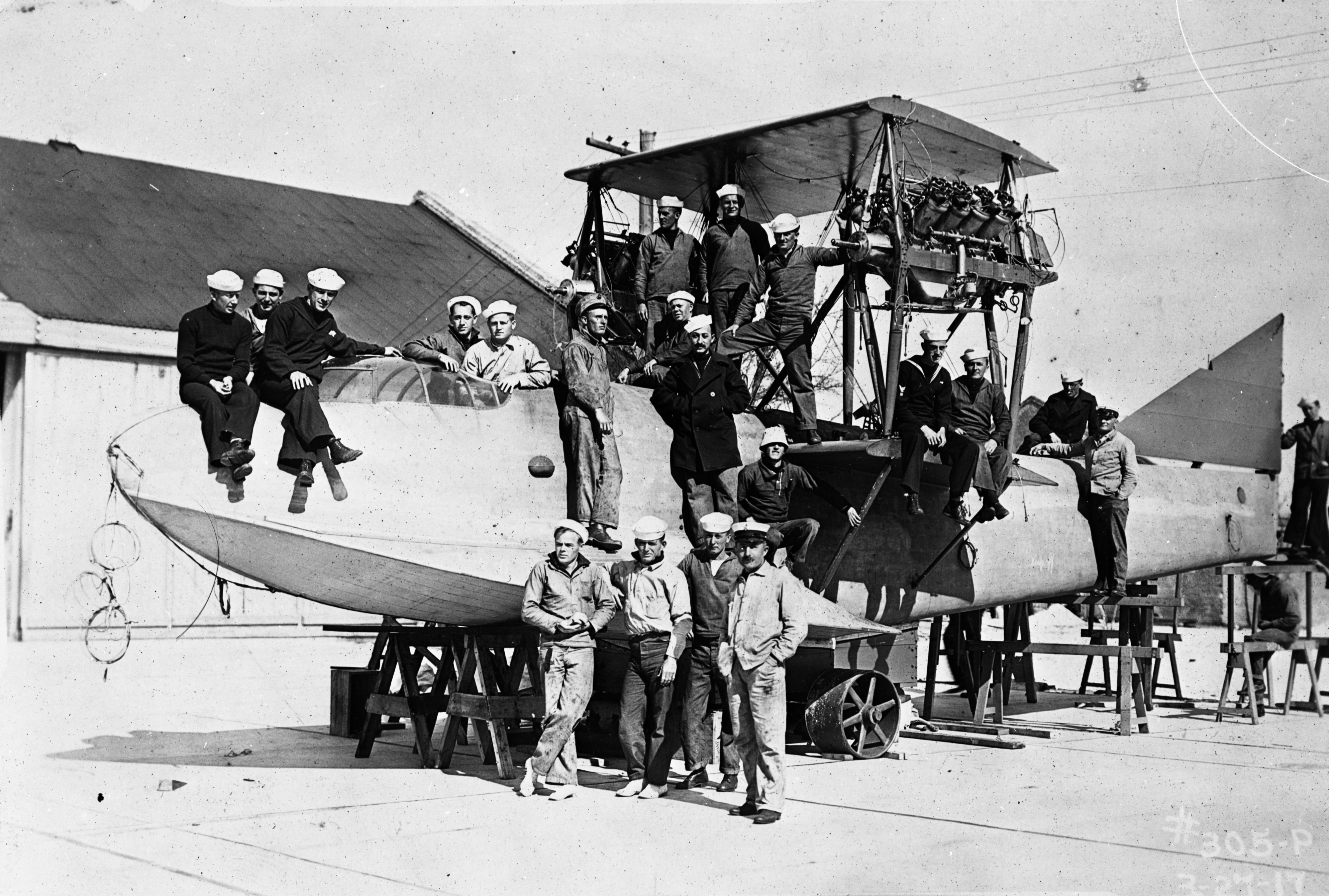Mary McLeod Bethune
Lesson Plans
Interview with Mary McLeod Bethune, ca. 1940
And strangely, the attendant who was with the Pope put his arms about my shoulders and said, “Oh blessed art thou among women.”
Page 19
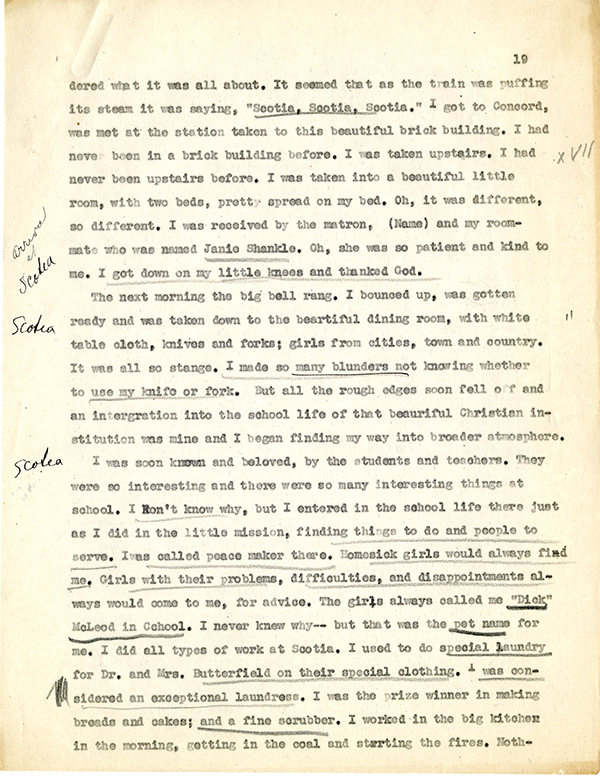
I got to Concord, was met at the station taken to this beautiful brick building. I had never been in a brick building before.
I was taken into a beautiful little room, with two beds, pretty spread on my bead. Oh, it was different, so different. I was received by the matron, (Name) and my roommate who was named Janie Shankle. Oh, she was so patient and kind to me. I got down on my little knees and thanked God.
The next morning the big bell rang. I bounced up, was gotten ready and was taken down to the beautiful dining room, with white table cloth, knives and forks. I made so many blunders not knowing whether to use my knife or fork. But all the rough edges soon fell off and an integration into the school life of that beautiful Christian institution was mine and I began finding my way into broader atmosphere.
I was soon known and beloved, by the students and teachers. They were so interesting and there were so many interesting things at school. I don’t know why, but I entered in the school life there just as I did in the little mission, finding things to do and people to serve. I was called peace maker there.
Homesick girls would always find me. Girls with their problems, difficulties, and disappointments always would come to me, for advice. The girls always called me “Dick” McLeod in school. I never knew why—but that was the pet name for me.
I did all types of work at Scotia. I used to do special laundry for Dr. and Mrs. Butterfield on their special clothing. I was considered an exceptional laundress.
I was the prize winner in making breads and cakes; and a fine scrubber. I worked in the big kitchen in the morning, getting in the coal and starting the fires. Nothing was too menial or too hard for me to find joy in doing, for the appreciation of having a chance.
I was taken into a beautiful little room, with two beds, pretty spread on my bead. Oh, it was different, so different. I was received by the matron, (Name) and my roommate who was named Janie Shankle. Oh, she was so patient and kind to me. I got down on my little knees and thanked God.
The next morning the big bell rang. I bounced up, was gotten ready and was taken down to the beautiful dining room, with white table cloth, knives and forks. I made so many blunders not knowing whether to use my knife or fork. But all the rough edges soon fell off and an integration into the school life of that beautiful Christian institution was mine and I began finding my way into broader atmosphere.
I was soon known and beloved, by the students and teachers. They were so interesting and there were so many interesting things at school. I don’t know why, but I entered in the school life there just as I did in the little mission, finding things to do and people to serve. I was called peace maker there.
Homesick girls would always find me. Girls with their problems, difficulties, and disappointments always would come to me, for advice. The girls always called me “Dick” McLeod in school. I never knew why—but that was the pet name for me.
I did all types of work at Scotia. I used to do special laundry for Dr. and Mrs. Butterfield on their special clothing. I was considered an exceptional laundress.
I was the prize winner in making breads and cakes; and a fine scrubber. I worked in the big kitchen in the morning, getting in the coal and starting the fires. Nothing was too menial or too hard for me to find joy in doing, for the appreciation of having a chance.
Page 20
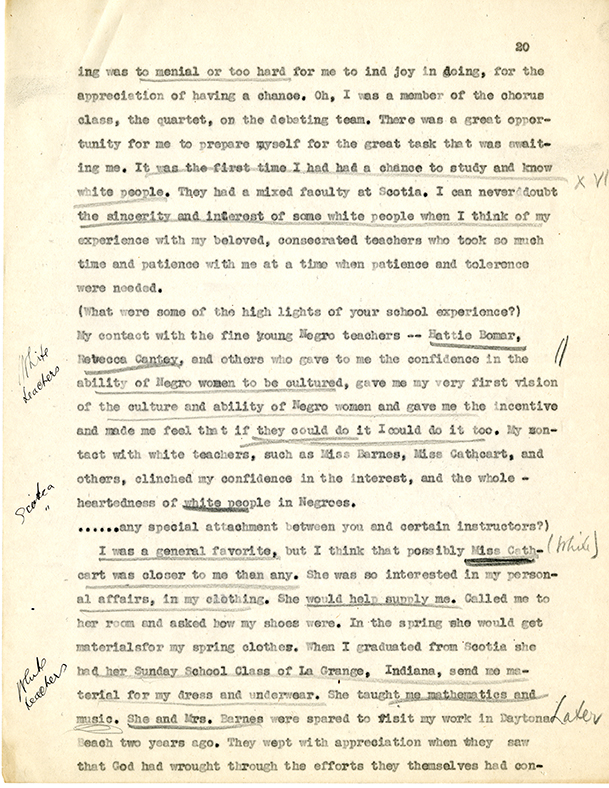
Oh, I was a member of the chorus class, the quartet, on the debating team. There was a great opportunity for me to prepare myself for the great task that was awaiting me.
It was the first time I had had a chance to study and know white people. They had a mixed faculty at Scotia. I can never doubt the sincerity and interest of some white people when I think of my experience with my beloved, consecrated teachers who took so much time and patience with me at a time when patience and tolerance were needed.
(What were some of the high lights of your school experience?)
My contact with the fine young Negro teachers – Hattie Bomar, Rebecca Cantey, and others who gave to me the confidence in the ability of the Negro women to be cultured, gave me my very first vision of the culture and ability of Negro women and gave me the incentive and made me feel that if they could do it I could do it too.
My contact with white teachers, such as Miss Barnes, Miss Cathcart, and others, clinched my confidence in the interest, the whole-heartedness of white people in Negroes.
(……any special attachment between you and certain instructors?)
I was a general favorite, but I think that possibly Miss Cathcart was closer to me than any. She was so interested in my personal affairs, in my clothing. She would help supply me. Called me to her room and asked how my shoes were. In the spring she would get materials for my spring clothes. When I graduated from Scotia she had her Sunday School Class of La Grange, Indiana, send me material for my dress and underwear. She taught me mathematics and music.
She and Mrs. Barnes were spared to visit my work in Daytona Beach two years ago. They wept with appreciation when they saw that God had wrought through the efforts they themselves had contributed to me years ago. They now live in Concord, North Carolina.
It was the first time I had had a chance to study and know white people. They had a mixed faculty at Scotia. I can never doubt the sincerity and interest of some white people when I think of my experience with my beloved, consecrated teachers who took so much time and patience with me at a time when patience and tolerance were needed.
(What were some of the high lights of your school experience?)
My contact with the fine young Negro teachers – Hattie Bomar, Rebecca Cantey, and others who gave to me the confidence in the ability of the Negro women to be cultured, gave me my very first vision of the culture and ability of Negro women and gave me the incentive and made me feel that if they could do it I could do it too.
My contact with white teachers, such as Miss Barnes, Miss Cathcart, and others, clinched my confidence in the interest, the whole-heartedness of white people in Negroes.
(……any special attachment between you and certain instructors?)
I was a general favorite, but I think that possibly Miss Cathcart was closer to me than any. She was so interested in my personal affairs, in my clothing. She would help supply me. Called me to her room and asked how my shoes were. In the spring she would get materials for my spring clothes. When I graduated from Scotia she had her Sunday School Class of La Grange, Indiana, send me material for my dress and underwear. She taught me mathematics and music.
She and Mrs. Barnes were spared to visit my work in Daytona Beach two years ago. They wept with appreciation when they saw that God had wrought through the efforts they themselves had contributed to me years ago. They now live in Concord, North Carolina.
Page 21
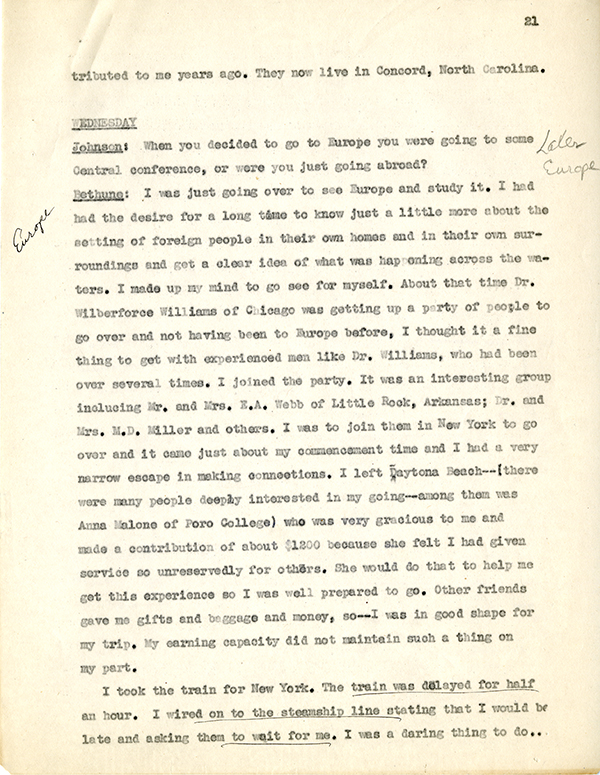
WEDNESDAY
Johnson: When you decided to go to Europe you were going to some Central conference, or were you just going abroad?
Bethune: I was just going over to see Europe and study it. I had had the desire for a long time to know just a little more about the setting of foreign people in their own homes and in their own surroundings and get a clear idea of what was happening across the waters. I made up my mind to go see for myself.
About that time Dr. Wilberforce Williams of Chicago was getting up a party of people to go over and not having been to Europe before, I thought it a fine thing to get with experienced men like Dr. Williams, who had been over several times. I joined the party. It was an interesting group including Mr. And Mrs. E.A. Webb of Little Rock, Arkansas; Dr. and Mrs. M.D. Miller and others.
I was to join them in New York to go over and it came just about my commencement time and I had a very narrow escape in making connections.
I left Daytona Beach -–(there were many people deeply interested in my going—among them was Anna Malone of Poro College) who was very gracious to me and made a contribution of about $1200 because she felt I had given service so unreservedly for others.. She would do that to help me get this experience so I was well prepared to go. Other friends gave me gifts and baggage and money, so—I was in good shape for my trip. My earning capacity did not maintain such a thing on my part.
I took the train for New York. The train was delayed for half an hour. I wired on to the steamship line stating that I would be late and asking them to wait for me. It was a daring thing to do…but they held the boat for thirty minutes for me.
Johnson: When you decided to go to Europe you were going to some Central conference, or were you just going abroad?
Bethune: I was just going over to see Europe and study it. I had had the desire for a long time to know just a little more about the setting of foreign people in their own homes and in their own surroundings and get a clear idea of what was happening across the waters. I made up my mind to go see for myself.
About that time Dr. Wilberforce Williams of Chicago was getting up a party of people to go over and not having been to Europe before, I thought it a fine thing to get with experienced men like Dr. Williams, who had been over several times. I joined the party. It was an interesting group including Mr. And Mrs. E.A. Webb of Little Rock, Arkansas; Dr. and Mrs. M.D. Miller and others.
I was to join them in New York to go over and it came just about my commencement time and I had a very narrow escape in making connections.
I left Daytona Beach -–(there were many people deeply interested in my going—among them was Anna Malone of Poro College) who was very gracious to me and made a contribution of about $1200 because she felt I had given service so unreservedly for others.. She would do that to help me get this experience so I was well prepared to go. Other friends gave me gifts and baggage and money, so—I was in good shape for my trip. My earning capacity did not maintain such a thing on my part.
I took the train for New York. The train was delayed for half an hour. I wired on to the steamship line stating that I would be late and asking them to wait for me. It was a daring thing to do…but they held the boat for thirty minutes for me.
Page 22
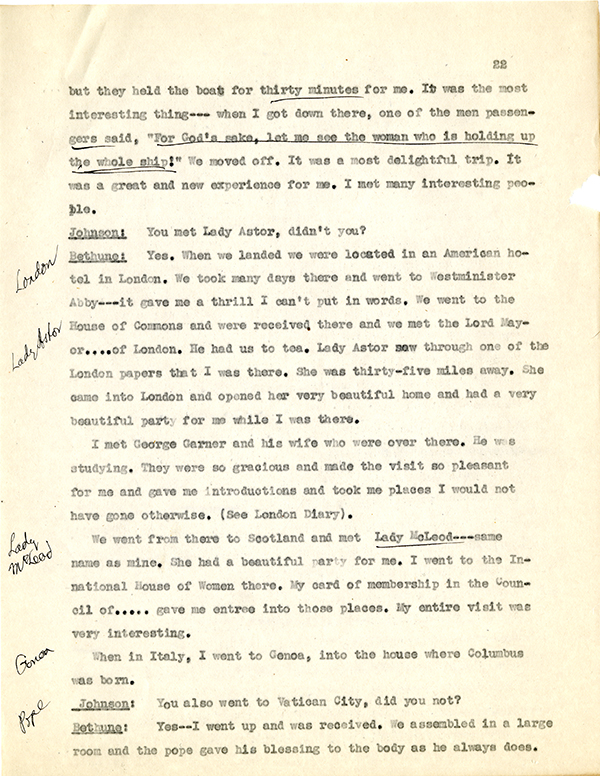
It was the most interesting thing—when I got down there, one of the men passengers said, “For God’s sake, let me see the woman who is holding up the whole ship!” We moved off. It was a most delightful trip. It was a great and new experience for me. I met many interesting people.
Johnson: You met Lady Astor, didn’t you?
Bethune: Yes. When we landed we were located in an American hotel in London. We took many days there and went to Westminster Abby--- it gave me a thrill I can’t put into words. We went to the House of Commons and were received there and we met the Lord Mayor….of London. He had us to tea. Lady Astor saw through one of the London papers that I was there. She was thirty-five miles away. She came into London and opened her very beautiful home and had a very beautiful party for me while I was there.
I met George Garner and his wife who were over there. He was studying. They were so gracious and made the visit so pleasant for me and gave me introductions and took me places I would not have gone otherwise. (See London Diary)
We went from there to Scotland and met Lady McLeod---same name as mine. She had a beautiful party for me. I went to the International House of Women there. My card of membership in the Council of….. gave me entrée into those places. My entire visit was very interesting. When in Italy, I went to Genoa, into the house where Columbus was born.
Johnson: You also went to Vatican City, did you not?
Bethune: Yes—I went up and was received. We assembled in a large room and the pope gave his blessing to the body as he always does.
Johnson: You met Lady Astor, didn’t you?
Bethune: Yes. When we landed we were located in an American hotel in London. We took many days there and went to Westminster Abby--- it gave me a thrill I can’t put into words. We went to the House of Commons and were received there and we met the Lord Mayor….of London. He had us to tea. Lady Astor saw through one of the London papers that I was there. She was thirty-five miles away. She came into London and opened her very beautiful home and had a very beautiful party for me while I was there.
I met George Garner and his wife who were over there. He was studying. They were so gracious and made the visit so pleasant for me and gave me introductions and took me places I would not have gone otherwise. (See London Diary)
We went from there to Scotland and met Lady McLeod---same name as mine. She had a beautiful party for me. I went to the International House of Women there. My card of membership in the Council of….. gave me entrée into those places. My entire visit was very interesting. When in Italy, I went to Genoa, into the house where Columbus was born.
Johnson: You also went to Vatican City, did you not?
Bethune: Yes—I went up and was received. We assembled in a large room and the pope gave his blessing to the body as he always does.
Page 23
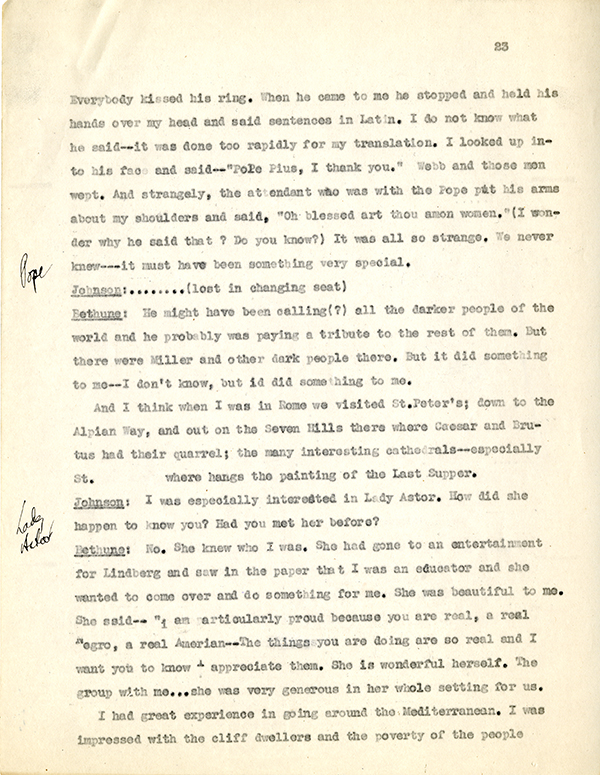
Everybody kissed his ring. When he came to me he stopped and held his hands over my head and said sentences in Latin. I do not know what he said—it was done too rapidly for translation.
I looked up into his face and said—“Pope Pius, I thank you.” Webb and those men wept. And strangely, the attendant who was with the Pope put his arms about my shoulders and said, “Oh blessed art thou among women.”
(I wonder why he said that? Do you know?) It was all so strange. We never knew---it must have been something very special.
Johnson:……..(lost in changing seat)
Bethune: He might have been calling(?) all the darker people of the world and he probably was paying a tribute to the rest of them. But there were Miller and other dark people there. But it did something to me—I don’t know, but it did something to me.
And I think when I was in Rome we visited St. Peter’s; down to the Alpian Way, and out on the Seven Hills there where Caesar and Brutus had their quarrel; the many interesting cathedrals—especially St. where hangs the painting of the Last Supper.
Johnson: I was especially interested in Lady Astor. How did she happen to know you? Had you met her before?
Bethune: No. She knew who I was. She had gone to an entertainment for Lindberg and saw in the paper that I was an educator and she wanted to come over and do something for me. She was beautiful to me. She said—“I am particularly proud because you are real, a real Negro, a real American—The things you are doing are so real and I want you to know I appreciate them. She is wonderful herself. The group with me…she was very generous in her whole setting for us.
I had a great experience in going around the Mediterranean. I was impressed with the cliff dwellers and the poverty of the people over there and the ignorance of the people in Lower Italy.
I looked up into his face and said—“Pope Pius, I thank you.” Webb and those men wept. And strangely, the attendant who was with the Pope put his arms about my shoulders and said, “Oh blessed art thou among women.”
(I wonder why he said that? Do you know?) It was all so strange. We never knew---it must have been something very special.
Johnson:……..(lost in changing seat)
Bethune: He might have been calling(?) all the darker people of the world and he probably was paying a tribute to the rest of them. But there were Miller and other dark people there. But it did something to me—I don’t know, but it did something to me.
And I think when I was in Rome we visited St. Peter’s; down to the Alpian Way, and out on the Seven Hills there where Caesar and Brutus had their quarrel; the many interesting cathedrals—especially St. where hangs the painting of the Last Supper.
Johnson: I was especially interested in Lady Astor. How did she happen to know you? Had you met her before?
Bethune: No. She knew who I was. She had gone to an entertainment for Lindberg and saw in the paper that I was an educator and she wanted to come over and do something for me. She was beautiful to me. She said—“I am particularly proud because you are real, a real Negro, a real American—The things you are doing are so real and I want you to know I appreciate them. She is wonderful herself. The group with me…she was very generous in her whole setting for us.
I had a great experience in going around the Mediterranean. I was impressed with the cliff dwellers and the poverty of the people over there and the ignorance of the people in Lower Italy.
Page 24
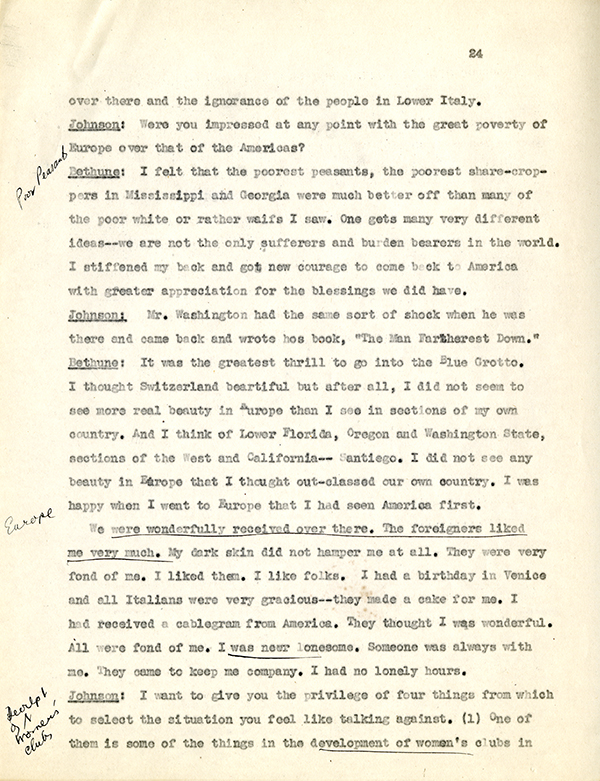
Johnson: Were you impressed at any point with the great poverty of Europe over that of the Americas?
Bethune: I felt that the poorest peasants, the poorest share-croppers in Mississippi and Georgia were much better off than many of the poor white or rather waifs I saw. One gets many very different ideas—we are not the only sufferers and burden bearers in the world. I stiffened my back and got new courage to come back to America with greater appreciation for the blessings we did have.
Johnson: Mr. Washington had the same sort of shock when he was there and came back and wrote his book, “The Man Fartherest Down.”
Bethune: It was the greatest thrill to go into the Blue Grotto. I thought Switzerland was beautiful but after all, I did not seem to see more real beauty in Europe than I see in sections of my own country. And I think of Lower Florida, Oregon and Washington State, sections of the West and California—Santiago. I did not see any beauty in Europe that I thought out-classed our own country. I was happy when I went to Europe that I had seen America first.
We were wonderfully received over there. The foreigners liked me very much. My dark skin did not hamper them at all. They were very fond of me. I liked them. I like folks. I had a birthday in Venice and all the Italians were very gracious—they made a cake for me. I had received a cablegram from America. They thought I was wonderful. All were fond of me. I was never lonesome. Someone was always with me. They came to keep me company. I had no lonely hours.
Johnson: I want to give you the privilege of four things from which to select the situation you feel like talking against.
(1) One of them is some of the things in the development of women’s clubs in America. No one has written their story yet. How they came into being and then how you became crystallized in these organizations and became head of these clubs and their leader, and established the Council of Women.
Bethune: I felt that the poorest peasants, the poorest share-croppers in Mississippi and Georgia were much better off than many of the poor white or rather waifs I saw. One gets many very different ideas—we are not the only sufferers and burden bearers in the world. I stiffened my back and got new courage to come back to America with greater appreciation for the blessings we did have.
Johnson: Mr. Washington had the same sort of shock when he was there and came back and wrote his book, “The Man Fartherest Down.”
Bethune: It was the greatest thrill to go into the Blue Grotto. I thought Switzerland was beautiful but after all, I did not seem to see more real beauty in Europe than I see in sections of my own country. And I think of Lower Florida, Oregon and Washington State, sections of the West and California—Santiago. I did not see any beauty in Europe that I thought out-classed our own country. I was happy when I went to Europe that I had seen America first.
We were wonderfully received over there. The foreigners liked me very much. My dark skin did not hamper them at all. They were very fond of me. I liked them. I like folks. I had a birthday in Venice and all the Italians were very gracious—they made a cake for me. I had received a cablegram from America. They thought I was wonderful. All were fond of me. I was never lonesome. Someone was always with me. They came to keep me company. I had no lonely hours.
Johnson: I want to give you the privilege of four things from which to select the situation you feel like talking against.
(1) One of them is some of the things in the development of women’s clubs in America. No one has written their story yet. How they came into being and then how you became crystallized in these organizations and became head of these clubs and their leader, and established the Council of Women.

 Listen: The Bluegrass & Old-Time Program
Listen: The Bluegrass & Old-Time Program